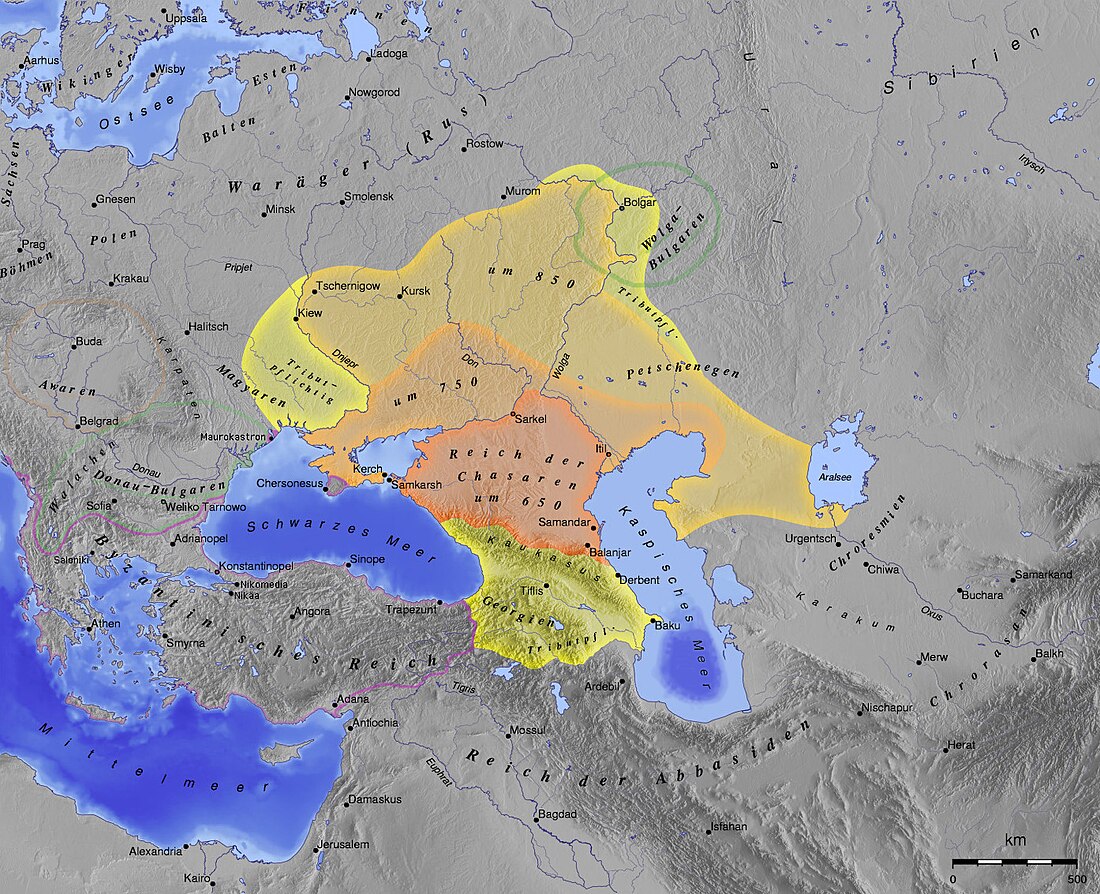Khazars
historical semi-nomadic Turkic ethnic group From Wikipedia, the free encyclopedia
Remove ads
The Khazars were a semi-nomadic Turkic people. They formed an empire called Khazaria in Russia from the 6th to 10th century CE.[10] They are said to have originated from the Western Turkic Khaganate of the Eurasian steppe, a vast plain encompassing Central Asia and southeastern Europe.[11]
Remove ads
Overview
Khazaria was an international trading center. It was a hub on the Silk Road that linked ancient China, the Middle East and the Kievan Rus'.[12][13] For three centuries (c. 650–965), the Khazars conquered the area from the Volga-Don steppes to Crimea and the Caucasus.[12]
Khazaria was located between the Byzantine Empire, the steppe nomads and the Umayyad Caliphate. It helped the Byzantines defend itself from the Sasanian Persian empire. The alliance ended around 900.[12] Between 965 and 969, the Kievan Rus replaced Khazaria.
Remove ads
Name
Khazar or Xazar may have come from *Qasar. The Turkic root qaz- means "to ramble, to roam" (used in Qazaqsa or Kazakh), similar to the Common Turkic kez-.[14]
Some claimed that it came from qas- ("tyrannize, oppress, terrorize") because it is similar to the Uyghur name Qasar.[15] Others see it as a person or tribe's name. For instance, the Chinese name Kesa for Khazars may be one of the tribal names of the Uyğur Toquz Oğuz of the Göktürks, namely the Gésà.[14][16]
However, others say Kesa was not a tribal name but the name of the chief of the Sijie (思結) tribe of the Toquz Oğuz. In Middle Chinese, the name Khazars always comes before the word Tūjué (Tūjué Kěsà bù: 突厥可薩部; Tūjué Hésà: 突厥曷薩).[17][18][19] Khazar language is extinct, while modern Turkic languages still refer to the Caspian Sea as the Khazar Sea.
Remove ads
Religions
Tengrism might have been the main religion of the Khazars just as it was for the Huns and many other Turkic tribes,[14] while Abrahamic religions were popular as well.[14] The Khazar ruling class is said to have converted to Judaism in the 8th or 9th century.[20][21][22][23][24]
Language
No known records of the Khazar language have survived. The state was polyglot and polyethnic.[25] The ruling elite probably spoke an eastern dialect of Shaz Turkic. The ordinary people may have spoken Lir Turkic, such as Oğuric, Bulğaric, Chuvash, and Hunnish. The Persian historian al-Iṣṭakhrī said that the Khazar language was different from any other known language.[26][27] After some Khazars became Jewish, they may have written in the Hebrew alphabet, if Ibn al-Nadīm told the truth.[28] Though they spoke a Türkic language, they might have also spoken Hebrew.[29]
Remove ads
History
Origin
They appear to have come from Mongolia (蒙古) or northern China after the Xiōngnú (Huns)[dubious ] were defeated by Han dynasty (漢朝) of China (Han–Xiongnu war). The tribes probably had Iranian,[30] proto-Mongolic, Uralic and Palaeo-Siberians. The Turkic tribes might have conquered the Western Eurasian steppe as early as 463.[14][31] In 552, they conquered the Rouran Khaganate (柔然汗國) and moved westwards, taking more people from Sogdia.[32]
The ruling family might have come from the Āshǐnà (阿史那) clan of the West Türkic (西突厥) tribes.[14] The Chinese and Arabic records are almost identical, indicating strong support for this theory. The leader might have been associated with Yǐpíshèkuì (乙毗射匱). He died around 651.[32] Moving west, the Khazars reached Akatziroi,[33] one of the important friends of Byzantium fighting Attila's army.
Khazaria
Khazaria is said to have emerged after 630.[34] It is said to have come from the Göktürk Qağanate following their defeat by the Tang Dynasty (唐朝) between 630 and 650. The Göktürk armies conquered Volga by 549. The Āshǐnà clan whose tribal name was 'Türk' (the strong one) arrived in 552. They overthrew the Rourans and created the Göktürk Qağanate.[35]
War with Tang Dynasty
The Chinese Tang Dynasty defeated the Turkic Qağanate and set up the Anxi protectorate (安西都護府) in Central Asia. The Khaganate split into several tribes.[36] Some tribes went west to the Sea of Azov area. Ashina and the Khazars went further west. In 657, General Sū Dìngfāng (蘇定方) dominated the Turks and Central Asia. They imposed Chinese overlordship to the east of those Turkic tribes. In 659 the Chinese defeated the remaining tribes. The Khazars did not dare return.
War with Bulgars
Instead, the Khazars defeated the Bulgars further west.[37][38] The Khazars Khaganate was then founded from the ruins of a nomadic empire destroyed by the Tang armies to the east,[32] becoming the westernmost successor state of the Göktürks.
Later conquests
The Khazars conquered the lower Volga region and the area between the Danube and the Dniepr. In 670, they also conquered the Onoğur-Bulğar union[39] and made the Onogur-Bulgar language the official language of the empire.[32]
Khazar Empire
The empire is sometimes popularly called a steppe Atlantis.[40] Historians often refer to this period as Pax Khazarica, which means "Khazarian peace" in Latin. The state became an international center of trade.[41]
Remove ads
Modern period
Despite the disappearance of the Khazars from history, theories about the Cossacks,[42] Muslim Kumyks,[43] Kazakhs, Crimean Karaites,[44] Krymchaks,[45] and Ashkenazi Jews[46] having descended from the Khazars are widely circulated. Most scholars of history and languages disagree with such theories.[47][48][49] Particularly, the theory that Ashkenazi Jews mostly or only descended from the Khazars is commonly known as the Khazar myth because it is by now disproven.[50] Decades of peer-reviewed genetic studies have found little or no scientific evidence for the Khazar myth.[51][52][53][54][55]
Remove ads
Related pages
References
Wikiwand - on
Seamless Wikipedia browsing. On steroids.
Remove ads

